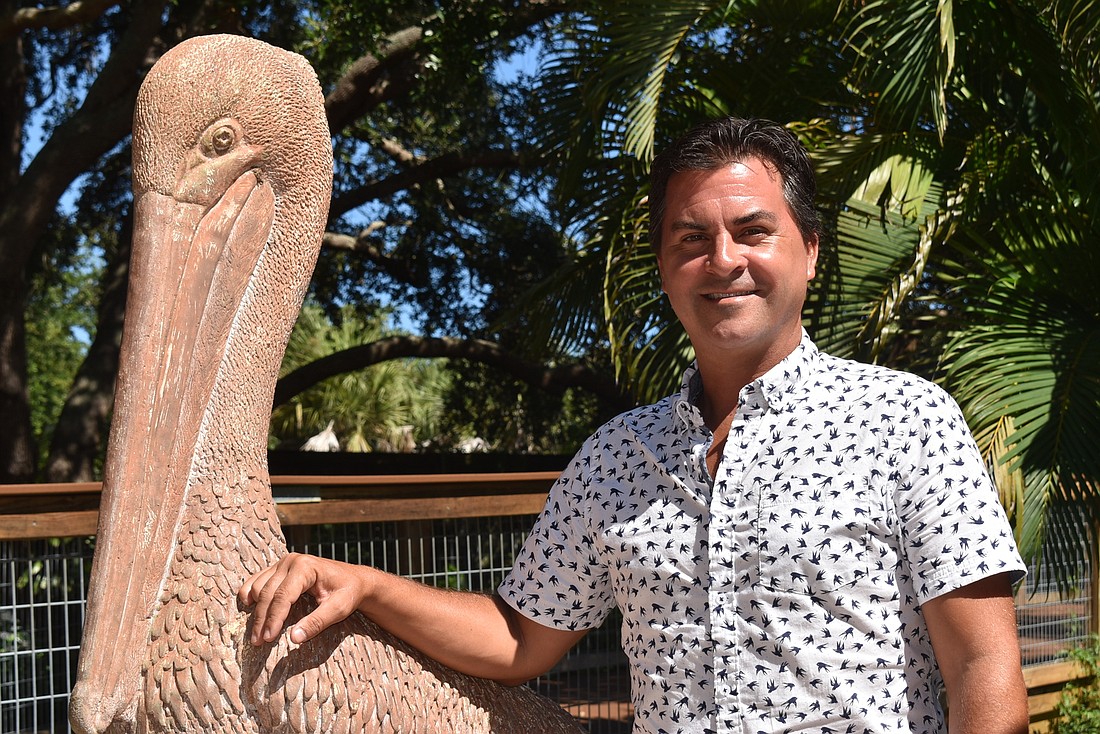- October 19, 2022
-
-
Loading

Loading

Self-described “bird guy” Aaron Virgin is the new CEO of Save Our Seabirds. After moving to Sarasota in late 2019, he began working for Mote Marine Laboratory and Aquarium as its philanthropy officer in October 2020 and now plans to put his fundraising background to work for the seabird organization on City Island. He follows David Pilston as Save Our Seabirds’ CEO and has a background in wildlife management, education programs and netting fundraising.
What drew you to Save Our Seabirds?
I was (at Mote) about nine months with the intent of staying two and a half, three years. You build a portfolio, you work with those folks, and maybe I would have stayed longer. But it was one of those things where I wasn't even looking, but this job just popped up, right? The funny thing is, I do a little bird walk around Ken Thompson Park here … As I was walking around here, I saw that this place was closed down, and I thought, “Wow, that's a bummer.” Mote started allowing more people in and the mask policy was dropped and all that. And this place still didn't open. I thought, “What is going on?” So I went on the website and saw they’re doing a capital campaign and that there's a lot of good stuff here. I would peek into the fence and I thought, “Wow, they're really sprucing up. They're really cleaning it up.” And then around the same time, I saw the job posting. It was one of those things where I saw it on my phone and I put my phone down really quickly because I was like, “This is good. This is bad.” … There were just so many reasons why (Mote) is a great place. But the birding part is who I am.
What do you see in the future of Save Our Seabirds?
We're probably looking at (restarting the capital campaign at the) end of this year, maybe early next year. I saw where this place was going and looking two, three years down the line, when the aquarium does move, this will be why people come to City Island. There's so much that can be done here. Back in 2018, the city granted a long-term lease to Save Our Seabirds, so then we can really lay out a big vision. It's just a great town in terms of philanthropy.
What are the priorities for Save Our Seabirds now?
The main thing we've been doing here, prior to my starting, was a reopening, and the team here has done a great job in terms of cleaning up the sanctuary and the aviary habitats, and there's all new signage. One, it's appealing, two, it's highly educational, and three, it just raises the visitor experience tremendously, because in the past, we just had maybe a name of the bird, but now you have what the bird looks like. We're doing free admission right now, just to get the people back in here. The other thing we're working on is how the reopening is impacting the birds. Interestingly, all signs point to that they kind of like the interaction. There's an enrichment to it right now.
How will Save Our Seabirds change under your leadership?
What I'm trying to do is just kind of get the ducks in a row, no pun intended, and see where we're at. My predecessor, his fundraising skill set was a little different. He was very keen on grants and community outreach and raising money that way, so I want to continue that but at the same time, my background is more major donors and really sitting down with people and viewing this as is almost like an investment, and doing events to have people learn more about the organization, learn a little bit more about me. (We will probably have) salon events, which would be your large donors, maybe a group of supporters who are bringing in some other people that are new to the organization, and that will feed into the capital campaign efforts. I've been in touch with the architects and the educational consultants and everyone's like, “Hey, whenever you're ready, let us know.” Same with the city. Everyone's on board. Everyone was supportive with the reopening.
When did you first consider yourself a “bird guy?”
I always considered myself a naturalist. I was always as a kid flipping over rocks, looking for salamanders and trying to catch frogs, that sort of thing. I was always outdoors, loved hiking and camping stuff like that … I started noticing birds coming back when I was in high school, so I went up to college and I was going to be taking a bunch of classes on field ecology. I was hiking by myself and I came face to face with a black-throated blue warbler. It’s very striking, so it was burned in my head. The whole hike down, which is probably about four or five hours, I was thinking about the bird and hearing other birds … so I found the Peterson Field Guide to Eastern Birds, and it was in there along with about 42 other warblers, and I'm like, “Oh, there's a whole group of birds called warblers,” and I became obsessed. Birders sometimes call it the gateway bird.